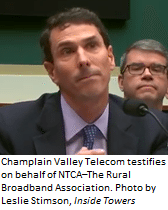
Leaders in four cities, Pittsburgh, Portland, Chicago and San Francisco, discussed projects like autonomous vehicles and “smart” traffic lighting and street lighting systems, of the future. All of those “smart” systems need spectrum as well as internet and wireless connectivity, said Dr. Jennifer Clark, Director of the Center for Urban Innovation and an Associate Professor for the School of Public Policy at the Georgia Institute of Technology.
Kurt Gruendling, Vice President of Marketing and Business Development for Waitsfield and Champlain Valley Telecom, a family-owned business in Vermont, testified on behalf of NTCA–The Rural Broadband Association. “To not have high speed internet today is unimaginable,” he said, yet millions of consumers nationwide don’t.
Recent reforms in the FCC’s Universal Service Programs “have resulted in a budget shortfall” which will lead to higher rates for consumers; such a shortfall “hurts small telecom providers” like his, he said, noting that “all of America needs to participate in the global economy.”
Such programs are important, he noted, discussing NTCA’s Smart Rural Community program, which focuses on a collaborative approach to deploy rural broadband. An example occurred in 2012, after Hurricane Irene devastated some local businesses. Vermont moved quickly to wire a building that withstood the storm with fiber and new telephone service for many local firms to move to, said Gruendling.
Asked what the federal government can do to facilitate 5G deployment, he and others testified that federal and state government could help define deployment regulations yet allow flexibility for local governments to use the regs to solve problems.
Permitting remains slow for deploying on public rights-of-way and easements, according to the expert. “We’re building the fiber optic network of the future, but in Vermont, we have a short building season,” he said, calling it a “time and money equation.”
March 17, 2017




Reader Interactions